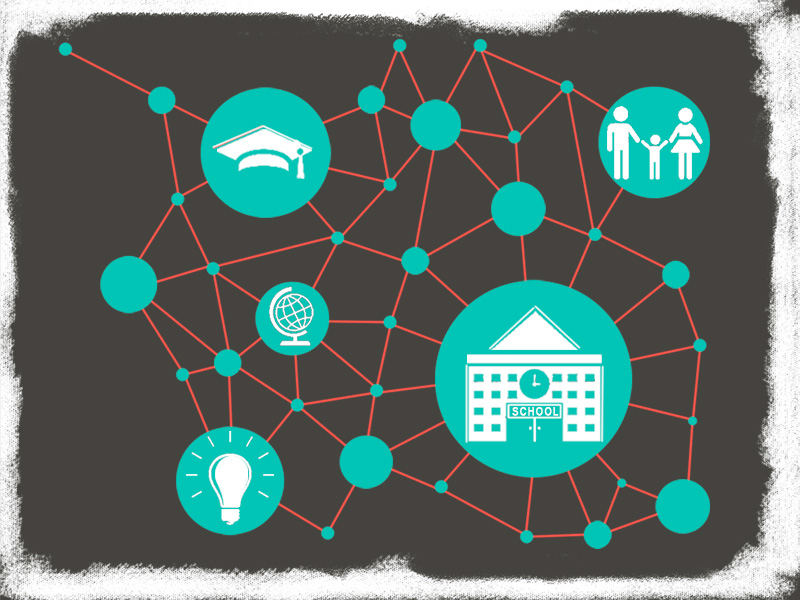Jordi Díaz-Gibson and Mireia Civís, coordinators of the NetEduProject
Fully immersed in the 21
st century, we can see that, at the educational level, efforts are being made to shift from organizational models based on hierarchical authority and control to more horizontal and network-connected organizational forms (Daly, 2010). This suggests a series of
transitions in the educational world from independence to interdependence; from centralized leadership to distribution of leadership; from responsibilities to co-responsibility; from specialists to multidisciplinary generalists, and from dogma to dialogue. Thus, we understand that educational change and innovation in schools or other socio-educational organizations have to acknowledge these organizations to be located in the context of a neighbourhood or a community and that, at the same time, this wider social system also has a relevant role in education.
Educational organizations have become more and more aware of the need to connect with their neighbourhood or community in order to improve their educational action. Recently there has been an increase in collaborative strategies among educational agents in the same area, thus setting up collaborative educational projects with attention focusing on children, youth and families themselves. These initiatives are based on the fact that the systematization of these relationships, formal articulation and sustained collaboration among educational organizations establish the basis for educational improvement. And from these ideas emerges the concept that sustains NetEduProject:
Educational Ecosystems.
An
Educational Ecosystem is the set of social relationships between educational actors in an educational organization, neighbourhood or community. An ecosystem is based on the idea that
enriching and promoting educational action demands the connection and collaboration among educational and social agents. These interconnections include internal –among professionals inside an organization– and external interdependencies –among organizations in the community such as schools, after-school entities, associations, social services, families, universities, companies, and so on–, and result in the establishment of synergies, shared construction of knowledge, and achievement of shared objectives. This is the rationale of educational action in the “network society” to meet the challenges of education in the 21
st century.
In the last twenty-five years, we have lived the emergence and consolidation of experiences based on this idea of Educational Ecosystems. Thus the empowerment of social relations between educational actors in the community has become a very present strategy in the national and international context as a response to current shared and complex challenges that require the joint action of agents involved. Then, these initiatives have emerged with different district educational programmes, area educational projects, local educational networks, local community educational plans, community educational partnerships, education action zones, neighbourhood educational associations or preferential education areas, among the most common examples. In short, we understand that these initiatives have a current focus on their Educational Ecosystems as they share a base on educational and social co-responsibility, community closeness, and interdisciplinary collaboration.
Educational organizations pursue specific goals, but these ecosystems take into account both, educational objectives and the content exchanged among agents through social links –ideas and knowledge, educational materials, emotional support, among others–, where bonds shape a certain structure of relationships (Scott, 2000). Thus, these ecosystems consist of all the educational agents in a community, that is, the professionals and other members of the organizations that work to achieve shared educational goals in a certain community.
Therefore, these initiatives are specifically focused on the qualitative process of transformation of both an organization and a community into educational ecosystems based on collaboration and innovation. At the same time, these ecosystems require the creation of a new way of working together on the basis of trust, by providing a new know-how based on interdisciplinary discussion and collaboration among educational and social professionals in the community (Díaz-Gibson & Civís, 2014).
Up to now, we can say that there are Educational Ecosystems’ initiatives that are improving education in Catalonia and all around the world. Particularly, North American, European and Australian researchers
have pointed at significant results achieved by these initiatives such as an improvement in school achievement (Carpenter et al., 2010; Renée & McAllister, 2011),
improvement of capacity to innovate (Sorensen & Torfing, 2010; Miller & Jaeger, 2011),
or the optimization of socio-educational resources in the community field, as well as an increase in organizational efficiency (Keast & Brown, 2002; Díaz-Gibson et al., 2010; Díaz-Gibson et al., 2016; Almirall et al., 2012).

